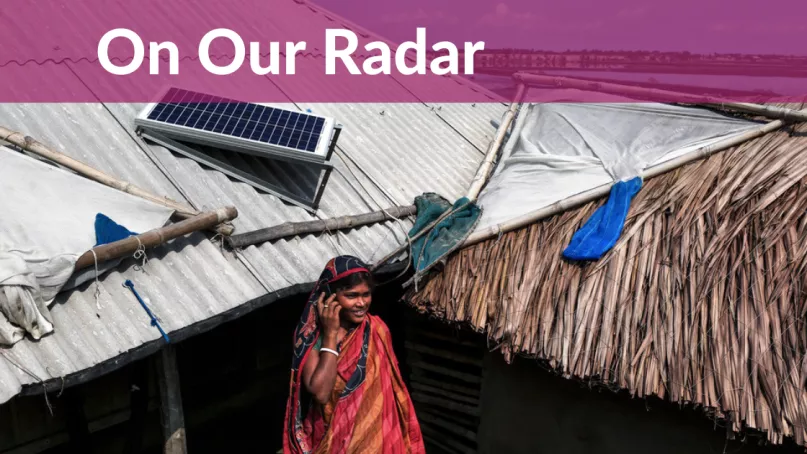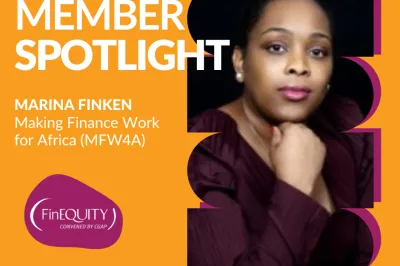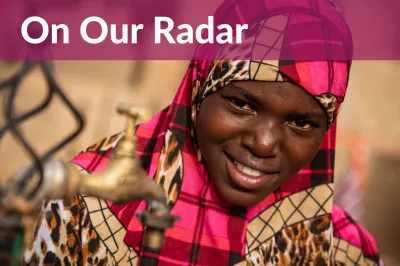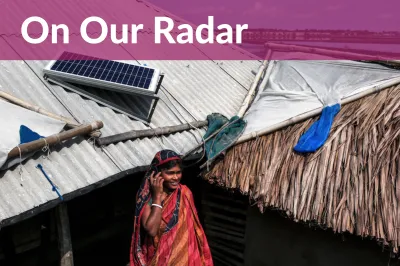On Our Radar: March 2023

An updated take on "What We're Reading", the FinEquity team brings you a curated list of women's financial inclusion and economic empowerment content we've been consuming recently, from podcasts, new initiatives and articles to videos and social posts.
On Our Radar
Maximizing the Impact of Financial Inclusion for Young Women
Research has shown that financial inclusion can contribute to improvements in both financial and non-financial outcomes for young women. However, the ~590 million young women in the world (defined as women ages 15-24) are a tremendously diverse group, transitioning through different life stages within vastly different contexts. Considering these differences, among which segments of young women could improved financial services make the most impact? Read this recent CGAP blog post to learn more.
Driving Digital Financial Transformation in Support of SDG 5: Recent Gains and Remaining Challenges
Access to and use of digital financial services (DFS) designed to meet women’s needs, incentivized by policies that make the services safe and affordable, lead to women’s active participation in the formal economy, increased GDP growth, higher labor force participation, and improved household bargaining power. Data from the World Bank’s Global Findex Database 2021 confirms the centrality of DFS in reaching financial access for all. This paper provides a brief overview of the current state of women’s access to and usage of DFS, details key issues that contribute to women’s financial exclusion, and provides a set of recommendations for policy makers and regulators to drive digital financial transformation in support of SDG 5.
Making Digital Platforms Work for Women in Rural Agricultural Livelihoods
The emergence of digital platforms for agriculture (AgTechs) offers an important opportunity to help rural women seize opportunities to improve their livelihoods. But despite their potential, most AgTechs struggle to engage rural women: while women represent 40-50 percent of smallholder farmers in Sub-Saharan Africa, they make up only 25 percent of AgTech users. And when AgTechs do reach rural women, low usage rates suggest that they are not sufficiently serving them, thus limiting the potential for meaningful impact on women’s lives. Synthesizing insights from research conducted with four digital platforms operating in Nigeria, Kenya, and India, this document highlights key areas where platforms have started incorporating gender-forward business practices with the potential to directly impact rural women.
Empowering women micro-entrepreneurs through mobile
This landscaping report, based on an extensive literature review and expert interviews, illustrates how women micro-entrepreneurs in low- and middle-income countries are currently using mobile phones for their businesses to connect with suppliers and customers, market their products and facilitate financial transactions. Yet women micro-entrepreneurs face substantial barriers to accessing and using these services, such as lower digital skills and affordability of mobile phones and data plans. The report also uncovers the opportunities for mobile ecosystem stakeholders to offer them more fit-for-purpose mobile products and services, through gender-disaggregated data collection and use, design and delivery of gender-intentional mobile products and services and digital skills training, among other measures.
New KfW study on female entrepreneurship: Women are underrepresented in new business ventures
Lively entrepreneurial activity makes an economy fit for the future by strengthening its ability to adapt and compete. In Germany, however, entrepreneurial activity has slackened in the past 20 years. In order for it to regain higher momentum, women play an important role, as they are today structurally underrepresented in new business creation. Over the long-term average, they represent only 39% of new business founders and indeed only 19% of innovative, growth-oriented start-ups. KfW Research has completed a new in-depth study of the challenges facing female entrepreneurship in Germany.
Global Assessment of Care-Related Infrastructure: Current Status, Impact and Policy Recommendations
The impacts of the COVID-19 pandemic highlight longstanding gender inequities in both unpaid and paid care work — and have brought care to the forefront of social and economic policy dialogues. WeProsper, a global coalition for women’s economic empowerment (WEE), developed this report to synthesize evidence to inform advocacy campaigns and policy recommendations. Given this evidence, WeProsper makes the case for policymakers to take action on and invest in care holistically, as they weigh the full range of COVID-19 recovery measures and other competing investment priorities.
Closing the Financial Inclusion Gender Gap During the Crisis and Afterwards
The COVID-19 pandemic continues to disrupt families and economies around the world. The enduring impact on the financial inclusion of women is clear. Unless urgently addressed, the setbacks are bound to accumulate and form a drag on growth instead of elevating the multi-trillion-dollar opportunities for women’s economic inclusion in developing countries. This report shows how AFI members managed to protect and promote women’s financial inclusion and effectively apply it as part of a crisis response during the pandemic.
Igniting SDG Progress Through Digital Financial Inclusion 2023 Edition
Building on the success of the first edition in 2018, the 2023 edition of Igniting SDG Progress Through Digital Financial Inclusion looks at evidence-based examples for the 13 global goals relevant to digital financial inclusion. This work is a collaboration between the Office of United Nations Secretary-General’s Special Advocate for Inclusive Finance for Development (UNSGSA Queen Máxima), Better Than Cash Alliance, the United Nations Capital Development Fund, CGAP, and the World Bank.
Toolkit on Gender Inclusive Policy Development
About a third of AFI members have specific interventions to increase women’s financial inclusion, but only 19 percent have reviewed existing policies and regulations through a gender lens. This toolkit aims to help members of the AFI network develop a common understanding of relevant gender concepts and provide practical guidance on designing gender inclusive policy interventions.
Social Protection and Microinsurance: Series of Case Studies on Bangladesh, Fiji, Ethiopia, Madagascar and Zambia
This series of country case studies (Bangladesh, Ethiopia, Fiji, Madagascar and Zambia) focuses on the design of microinsurance programmes and their linkages with social protection, including good practices and recommendations for replication in other countries and the strengthening of cross-functional work. Key informant interviews (KIIs) were conducted with WFP stakeholders (at global, regional and/or country level) working on social protection/climate and resilience in the selected countries.


